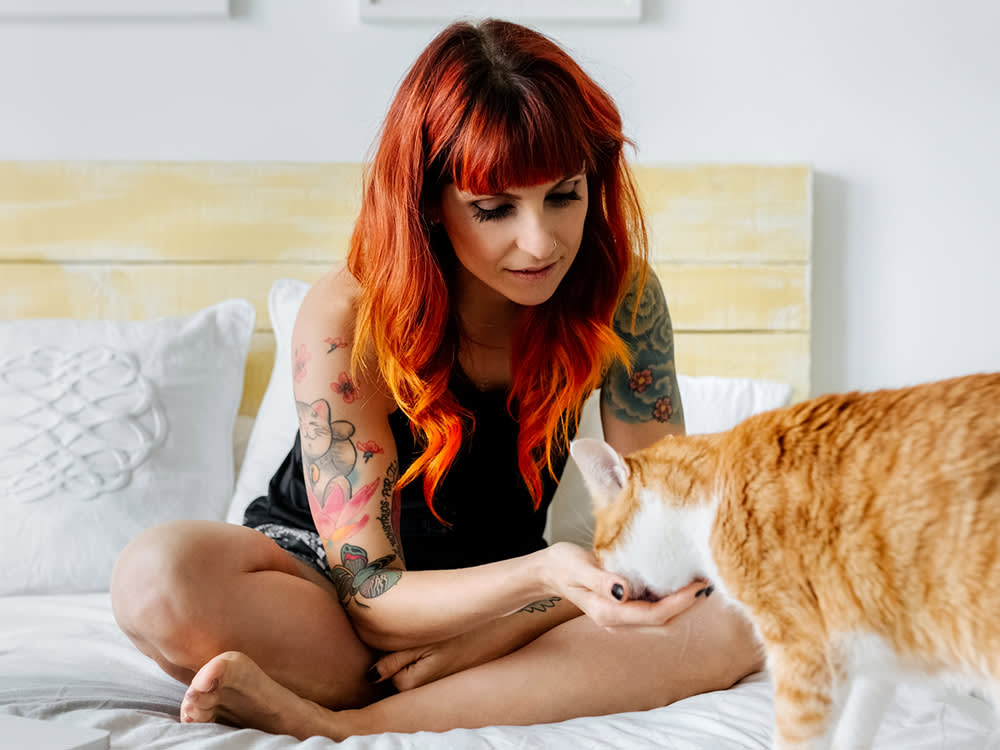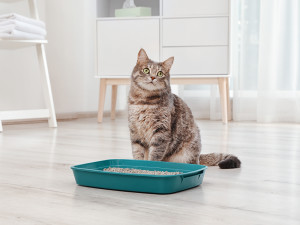Does My Cat Really Need to See a Vet?
Cats can be hard to read. Especially when they’re sick. Or… not sick? We asked a veterinarian how to tell

Share Article
Cats can be hard to read. Especially when they’re sick. Or… not sick? It’s so hard to tell! And the next thing you know you’ve turned your day upside down and rushed over to the vet only to be told, “It’s probably nothing – just keep an eye on them and bring them back if anything changes.”
Look, times are tough. And vets can be expensive. That’s assuming you can even get in for an appointment. And, yes, when it comes to the health of your pet, it’s better to be safe than sorry. But wouldn’t it be nice to know if you’re overreacting before you wrangle that moody ball of fur into a carrier?
That’s why we spoke with Dr Annette Louviere – a licensed veterinarian specialising in cats and an active member of the American Association of Feline Practitioners – to see if we could gain some insight into when it’s truly necessary to take your cat to the vet and when it’s maybe better just to stay at home and wait. Because not everything is an emergency. It can’t be, right? And if not, you shouldn’t have to treat it like it is.
Is it a common occurrence that people bring their pets in and it turns out to be nothing?
I never want to undermine a pet parent’s concern, especially since cats are skilled at hiding their illness. But…
One issue that comes to mind is when a cat is sneezing with scant amounts of clear discharge and no changes to energy levels, appetite, etc. This is especially common after an event the cat finds stressful: a recent change in environment, people visiting, a new addition to the family, etc, and can often be attributed to a flare-up of an upper respiratory virus, like feline herpes. Luckily, most cases will resolve within a few days without much intervention necessary. That said, if the discharge ever becomes green or yellow, then it’s time to see the veterinarian.
What are some symptoms we should take our cats to the vet for?
Any change in appetite or activity is worrisome in cats, and it’s sometimes very subtle. Cats are stoic creatures who will hide illness as long as possible, so if pet parents are observing lethargy or a decreased appetite, then it’s important to get on top of why these things are happening.
While cats have emotions and are undoubtedly smart creatures, they don’t act out of spite or revenge. If a cat is demonstrating inappropriate elimination, then it’s best to rule out medical causes, like idiopathic cystitis or urinary crystals, before considering it’s a behavioural preference, like an aversion to the litter substrate or box location.
What about hairballs – are they are normal?
It’s well known that cats may produce an occasional hairball. However, if vomiting is routinely frequent – and I qualify that as more than twice monthly, hairballs included – then it may be a sign of something brewing. Frequent vomiting is a non-specific clinical sign and can be associated with things ranging from parasites to food intolerance to inflammatory bowel disease and more.
How do I know when something is really and truly an emergency?
Calling the emergency vet and asking them may help give some indication for a sense of urgency. And there are a few signs that definitely warrant an emergency visit. This is not a comprehensive list by any means, but it’s a good place to start:
obvious signs of pain
straining to urinate or defecate
difficulty breathing
significant amount of bleeding or an open wound
seizures or collapsing episodes
inability to move one or more limbs
any toxin or poison ingestion
How do I talk to my vet about the need to take care of my pet and the realities of my financial situation?
Some vets may be looking at the big picture of your cat’s health, while others focus on the problem at hand. Neither approach is wrong, per se. But it’s good to have an open dialogue with your veterinarian so you’re on the same page regarding the approach to your pet’s health.
You should also feel comfortable asking questions and discussing next steps with your veterinary team. It shouldn’t be a one-sided conversation. So, it’s OK to ask, ‘What information will this test give us, and how will knowing that help?’ Open communication between veterinarians and pet parents is important for both sides to make the most informed decisions. This way, they are aware of both your needs and your pets’.

Charles Manning
Charles Manning is an actor, writer, and fashion/media consultant living in New York City with his two cats, Pumpkin and Bear.
Related articles
Your Cat Is Limping. Now What?
When it’s no big deal and when you should worry
![kitten lying on the floor breathing through his mouth]()
Is My Cat... Panting?
“Cats don’t pant to cool off like dogs do.” Unless your pet is catching their breath after doing the zoomies, Dr Gary Weitzman says panting could be cause for concern
![Ginger adult cat sits in flowering summer garden on pavement.]()
What to Do if Your Cat Gets Stung By a Bee
It’s not always as simple as scraping out the stinger. Find out everything you need to know
![Siamese cat in the middle of sneeze]()
Did Your Cat Just Sneeze Like a Human? Here’s Why
Kitty sneezes can be alarming, but they’re not always cause for concern
![Cat sitting by its litter box]()
Is Your Cat Full of Sh*t?
Seriously, though – here’s how to deal with cat constipation
![brown cat in grass]()
Hairballs: A Tangled Web
What to do when your cat hawks one up
![Siamese cat coughing]()
Why Is Your Cat Coughing?
You thought it was a hairball, but nothing’s coming up







